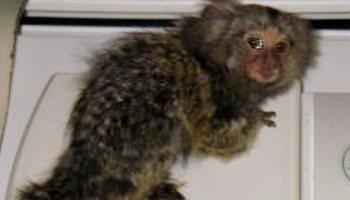- Find a Pet
- Advice and Welfare
- Ways to Give
- Get Involved
- What We Do
- Search
- My RSPCA
- Report a concern
- Gift in Wills
-
Colour modeVivid Calm
Keeping marmosets as pets
Marmoset monkeys are the most commonly kept and traded species of primate in the UK. Most of these are common marmosets, but we also see others like Geoffroy's marmosets and sometimes hybrids of two species.
Baby common marmosets, being so small, have been mis-sold as pygmy marmosets or 'finger monkeys'. They're being taken from their mothers far too early by breeders who convince buyers they can be tamed, and that it's ok to keep a one on their own. These animals are destined for many problems later on in their lives.
Find out more about marmosets and learn why they shouldn't be kept as pets.

Where do marmosets come from, and what do they eat?
Marmosets are mainly found in the tropical rainforests of South America, with a few residual populations in Central America. Marmosets mostly eat sap and gum from trees, but they also eat leaves, fruit, seeds and flowers, as well as insects, snails, lizards, frogs and small birds.
Are marmosets good pets?
There are a number of reasons why marmoset monkeys do not make suitable pets, including:
- Marmosets can live up to 18 years – they're a serious long-term commitment
- as they mature, they can become aggressive
- they're wild animals that have very specific welfare needs. It's impossible to provide the complex, rich environment they need when kept as a pet
- they're tropical animals who require a warm climate
- Marmosets scent-mark their surrounds and will spread their pungent smell all over the furniture
- they're highly intelligent creatures who get easily bored, and so need a complex stimulating environment
-
they're highly social – in the wild, they create stable family groups, so to keep them alone is cruel and unnatural
Is it legal to own a marmoset in the UK?
Unfortunately, it's technically legal to own a marmoset in the UK, although regulations introduced in 2024 will require owners in England to have a licence in future.
Taken from the wild and kept as a pet: Mikey's story
Mikey was just four months old when we rescued him. He was a victim of the pet trade.
He was suffering from a crippling metabolic bone disease (rickets), as his breeders had failed to care for him properly. His condition was so bad that poor Mikey had difficulty walking on bent legs and was unable to climb. He could only scramble across the floor to get around.
A couple bred Mikey at their home in Stourbridge then sold him. They didn't check if the buyer had any prior knowledge of caring for monkeys. He was handed over in a hamster cage in a car park, assuring the new owner he was well.
Mikey's new owner soon realised something was wrong after seeing him move around and contacted us for advice.
Mikey suffered, both mentally and physically
Vets found Mikey hunched up, petrified and distressed. X-rays showed he had seven fractures throughout his tiny body. Two areas of his tail were bent, and he could only shuffle around.
His bone disease was in such an advanced stage, and restricted his movement to such an extent, that a vet took the difficult decision to put Mikey to sleep to end his severe suffering.
Another four adult common marmosets were removed from the breeders and rehomed at Monkey World in Dorset.
Mikey's story isn't unique. This is why we believe primates should never be kept as pets.




